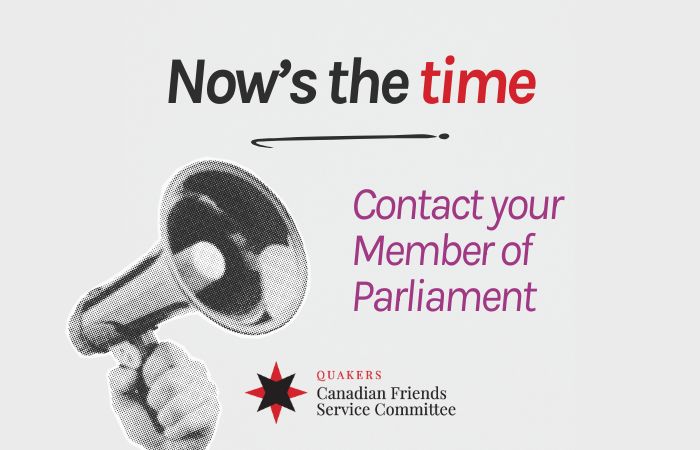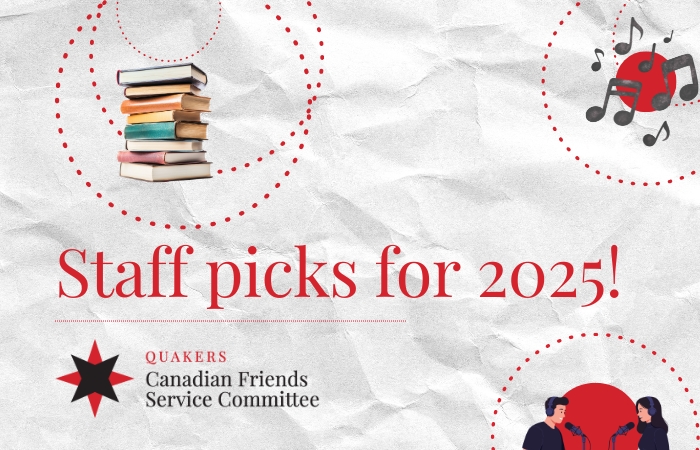
Annual accountability report 2025
October 20, 2025
Unshackled: wisdom from a formerly incarcerated woman
October 22, 2025Did you know that 60 government bills have been introduced in the House and 40 in the Senate since June? Unless you’ve been paying careful attention you might have missed some of the flurry of possible changes to Canada’s laws. Our Ottawa office is working hard together with various coalitions and partners. Here’s some of what we’re tracking:
C-2: “Strong borders act”
Introduced by the Minister for Public Safety in June. Currently at second reading stage. CFSC joins many in seeing this as an assault on refugee rights, civil liberties, gender justice, and migrant advocacy. C-2 is an omnibus bill that, according to our partners at the International Civil Liberties Monitoring Group:
- Arbitrarily limits the ability of individuals to claim asylum in Canada, in violation of international human rights law.
- Allows police and intelligence agencies warrantless access to our personal information, in violation of privacy rights.
- Grants government the power to issue secret orders to internet service providers to modify their systems to facilitate surveillance and possibly undermine encryption, placing our data at risk.
- Allows for the mass cancellation or suspension of the processing of immigration documents (e.g. visas and permanent residency cards) for entire groups of people, including individuals from certain countries.
- Allows Canada Post to open and search our letter mail.
CFSC along with 300 organisations has called for the bill to be withdrawn.
C-12: “Strengthening Canada’s immigration system and borders act”
In response to the overwhelming pushback against Bill C-2 from both civil society and some politicians, the government tabled C-12 in October as a new Bill rather than make amendments to C-2. While having removed some of the egregious privacy and civil liberty concerns, most of Bill C-12 retains the anti-migrant and anti-immigration policy elements which don’t address many of the problems with Bill C-2. It is important to note that maintaining both Bills means that the expansion of surveillance powers remain in Bill C-2, and the immigration provisions that restrict access to protection and expand mass status-cancellation are now included in Bill C-12. At CFSC, we continue to call for the withdrawal of both pieces of legislation.
![]()
C-5: “Building Canada act”
Introduced by the Minister of Internal Trade, it was fast-tracked through the legislative process in just under 4 weeks and received royal assent on June 26th. CFSC believes that part two of the Bill required greater scrutiny that it did not get. This will most likely have ramifications in the future, especially harming Indigenous Peoples in Canada. CFSC identified that C-5:
- Undermines constitutional and Treaty rights, as well as rights enshrined in existing Canadian law under the UN Declaration on the Rights of Indigenous Peoples Act.
- Weakens the Crown’s duty to consult and accommodate, the implementation of which is already very problematic in practice.
- Disregards the minimum standard of free, prior, and informed consent (FPIC), as affirmed in the UN Declaration on the Rights of Indigenous Peoples Act (section 7 of the C-5 mentions the need to “consult”, but does not mention FPIC).
- C-5 allows for the designation of National Interest Projects (NIPs) by a single Minister and imbues the Cabinet with broad discretionary powers for regulatory approvals.
Having moved ahead with such speed and disregard for consultation and due process, the government has invited the possibility of future direct-action protests and legal challenges which would offset any regulatory efficiency gained by the fast-tracking process.
C-9: “Combatting hate act”
Introduced by the Minister for Justice in September, it’s currently at consideration in committee (Standing Committee on Justice and Human Rights). Bill C-9 proposes several measures that could limit constitutionally protected rights—such as freedom of expression, freedom of assembly, and equality—without offering any safeguards beyond those already established under existing criminal law.
Essentially it’s duplicating existing legislation, as hate crime laws already cover portions of what is being proposed. Additionally, the legislation stands to create new criminal offenses and allows police to decide when they feel like laying these charges. Broad civil society concerns include that C-9:
- Gives police discretionary powers to determine which symbols are hateful and what protesters intentions are, which will lead to more arbitrary arrests and disruptions of peaceful assemblies.
- Significantly undermines free expression and dissent by including these new broad and discretionary powers and creating increased jail sentences—sending a chill amongst those who would otherwise take part in protests.
- Gives police the discretion to lay hate propaganda charges directly, without the (currently needed) Attorney General oversight.
Within the context of Palestinian solidarity and anti-genocide protests, C-9 is highly alarming, and seems to be the federal response to ‘bubble laws’ that are being passed by some municipalities across the country. CFSC joins partners and other organizations in asking for the withdrawal of the bill.
C-233: “An act to amend the export and import permits act (the ‘no more loopholes act’)
Introduced as a Private Members Bill (PMB) in September, the bill is at the second reading stage. The PMB seeks to close the loopholes that currently exists in Canada’s Export and import permits act, where Canadian made weapons and component parts end up going to the US, where they can be used or included in shipments sent to countries/governments that are found to have human rights abuses. The legislation, if passed, would make Canada compliant with its obligations under the Arms trade treaty (ATT). The legislation would:
- Apply export controls to all arms, parts, and technology.
- Remove the US and other country-based exemptions from the Export control list.
- Require end-use certificates to prevent diversion to human rights abusers.
- Mandate annual reports to Parliament on Canada’s compliance with the ATT.
CFSC is working with partners and networks to support this legislation. To pass and become law, your MP needs to vote in favour of this Bill. If so led you can contact your elected representatives using tools shared by the Arms Embargo Now campaign.
C-242: “Jail not bail act”
Introduced in September as a private members bill, C-242 seeks to repeal the “principle of restraint,” toughen bail for major violent and organized crimes, require judges to consider an accused’s criminal history, and stop prolific offenders from vouching for other criminals. CFSC is monitoring the passage of this Bill but also keeps in mind that the government intends to introduce its own legislation regarding bail and sentencing reforms in the near future, possibly making C-242 moot. CFSC does not support this legislation and seeks to support efforts that are evidence-based, proven to actually work, and are more humane.
S-2: “An act to amend the Indian act (new registration entitlements)”
Introduced in the Senate in June, this Bill seeks to correct long-standing inequities in how Indian status, federal registry, and band membership are handled under the Indian act. Bill S-2 replaces the earlier Bill C-38, which was first introduced in December 2022 but died on the order paper following the prorogation of Parliament in January. The proposed amendments would also address individual deregistration, natal band reaffiliation and membership, as well as outdated and offensive language related to dependent persons. CFSC is monitoring the passage of this legislation and supports it, as it represents an important part of Indigenous Peoples’ right to self-determination.
S-205: “Providing alternatives to isolation and ensuring oversight and remedies in the correctional system act (Tona’s law)”
Introduced in the Senate in October, Bill S-205 aims to end practices of isolation in federal prisons. In 2018, the government committed to ending segregation and solitary confinement in federal prisons and claimed that newly introduced Bill C-83 would do so. The Senate identified key gaps in the legislation that it foresaw would continue harmful, unlawful, and unconstitutional isolation, and proposed vital amendments to try to safeguard and uphold Charter and human rights.
Bill S-205 reintroduces the original amendments proposed by the Senate to provide meaningful alternatives to practices of isolation, including:
- A requirement that if a person in a federal prison has disabling mental health issues, they be transferred to a hospital in the provincial health system.
- A requirement that a superior court approve any isolation of a person for longer than 48 hours.
- The extension of measures allowing prisoners to be transferred from prison to the care and custody of Indigenous communities, to include other marginalized groups.
- In situations where the Correctional Service of Canada breaks the law and unfairly interferes in the administration of a sentence, individuals may apply to the sentencing court for a remedy, be it a reduction in sentence or in parole ineligibility period.
CFSC supports the passage of Tona’s law and was present for its passage in the Senate in the previous Parliament. We again hold out hope for its passage as segregation and the structured intervention units (SIUs) that replaced it continue to be deeply harmful.
S-206: National framework for a guaranteed livable basic income act
Introduced in the Senate in May, Bill S-206 seeks the creation of the first national framework for an unconditional Guaranteed Livable Basic Income for all persons over 17 across Canada. It is a successor to Bills S-233 and C-223, which were introduced in 2021 in the Senate and House. S-233 passed second reading and was sent to Committee in 2023 but was terminated in 2025 with the prorogation of Parliament. As an update to S-233 and C-223, S-206 includes some very moderate changes as it:
- Expands the scope and nature of the consultations that should inform the drafting of the framework.
- Reiterates the jurisdictional responsibilities of provincial and Indigenous governments.
- Removes the requirement that the framework include temporary workers, permanent residents, and refugee claimants.
This updated iteration of the Bill recognizes that GLBI is not, in and of itself, a total solution to poverty, and therefore requires that it be complimented by national standards for health and social supports that would work alongside the program. It also explicitly forbids the introduction of a GLBI causing a reduction in the services or benefits people are receiving as part of exceptional health or disability programs.
Last year CFSC endorsed GLBI as a way to achieve greater equity and has advocated to see the implementation of a GLBI in Canada. With S-206 at second reading, now is a good time to contact your Member of Parliament asking where they stand on a GLBI. Share with them your views on why a GLBI is important for you and the community.
S-236: “An act to amend the Canadian victims bill of rights and to establish a framework for implementing the rights of victims of crime”
Introduced in the Senate in October, this Bill seeks to strengthen the Canadian victims bill of rights by making key information to victims provided proactively, not only on request, and by creating a right to tailored support services. It reframes restitution as a broader right to reparations, including access to restorative justice and assistance to enforce restitution orders. It centralizes the federal complaints process with a designated authority, mandates regular training for justice system personnel, and requires a national implementation framework with standards, awareness, and reporting.
CFSC is monitoring the passage of this legislation as it provides greater nuance and options to those impacted by wrongdoing and directly names the option for accessing restorative justice. Those who have been harmed are often overlooked within the current legal system as the ‘Crown’ acts on their behalf but does not necessarily consult them on the legal process.
Motion pertaining to the situation in Gaza—debate Oct 7th, 2025
“Motion: That, in light of findings and orders from the International Court of Justice and the International Criminal Court on the situation in Gaza, the Senate call on the Government to examine the risk to Canada and Canadians of complicity in violations of international humanitarian law, including war crimes, crimes against humanity, and genocide, and to report on its findings within three months of the adoption of this motion.”
CFSC is monitoring the outcome of this motion presented in the Senate and is interested if, through the Senate, the government will examine its risk in being complicit to violations of international humanitarian law and the war crime of genocide. CFSC will look at ways to support a positive vote on the motion.




